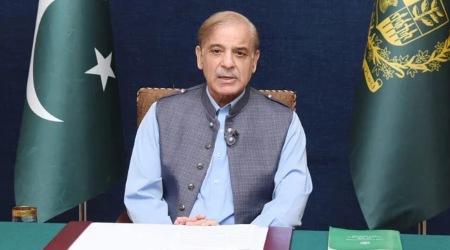ISLAMABAD: Departing Prime Minister Shehbaz Sharif expressed his pride in being the center of attention for the establishment over the past three decades.
He noted that a hybrid system that benefits the nation’s advancement holds more merit. These remarks came during a farewell event held at the Prime Minister’s House prior to the announcement of the caretaker PM for the country. Esteemed journalists and news anchors were in attendance.
PM Shehbaz addressed various subjects during his 16-month tenure, including the economy, legislation, and concerns about heightened military influence in civilian affairs. He also discussed media freedom and other sensitive matters while answering questions from the media.
In response to inquiries, the Prime Minister was questioned about his attribution of the success of the Bhara Kahu Bypass project to Chief of Army Staff General Asim Munir, aside from his efforts to promote investment in the nation. In his response, he mentioned that progress on the Bhara Kahu project, conducted in partnership with the National Logistics Cell (NLC), had been sluggish. Consequently, he approached the army chief to expedite the project. He acknowledged that General Asim Munir’s involvement ensured the project’s timely completion, prompting him to credit the army chief.
PM Shehbaz also highlighted his amicable relations with the establishment, not just the current one, but with previous establishments as well. He expressed pride in maintaining these relations.
During his conversation, the Prime Minister delved into his administration’s economic achievements. He recounted the challenges faced during his coalition government’s 16-month term, with difficulties arising on multiple fronts, especially in the economic arena. He noted that although some stability was attained in the economy following an agreement with the International Monetary Fund (IMF), the specter of default receded, yet inflation remained a pressing concern.
The Prime Minister admitted that despite efforts, his government was unable to substantially alleviate the common man’s burden during the 16-month period. He claimed that inflation had marginally decreased in the final four months of his tenure, but more measures were necessary to provide relief.
Subsequently, PM Shehbaz addressed queries about potential election delays, hurried legislation conflicting with fundamental human rights, and the dynamics of civil-military relations during his tenure, among other sensitive topics.
When questioned about the swift passage of amendments to the Army Act and Official Secrets Act through parliament without reference to relevant committees, despite facing opposition from coalition parties, he justified the necessity of these amendments. He cited a recent incident where an intelligence officer’s information was widely disseminated, causing distress to the martyr’s family. This underscored the need to amend the Official Secrets Act to prevent such situations.
During the conversation, inquiries arose about the military’s involvement in civilian and economic affairs. The PM acknowledged that his term witnessed an increased engagement with military leadership. He maintained that if a hybrid model fosters the nation’s progress, it is a positive approach.
The Prime Minister highlighted the military’s commitment to the nation’s advancement, exemplified by the establishment of the Special Investment Facilitation Council (SIFC). This initiative brings together military and civil leadership to facilitate investment in sectors like agriculture, IT, and minerals.
(Islamabad51-Newsdesk)














